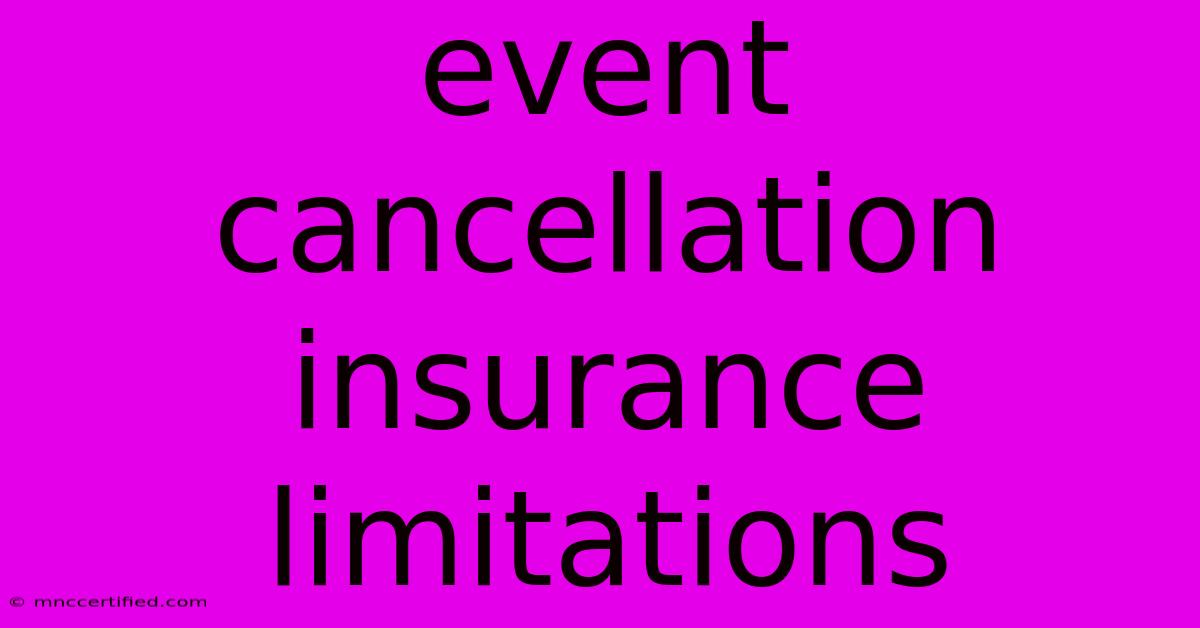Event Cancellation Insurance Limitations

Table of Contents
Event Cancellation Insurance: What You Need to Know About Limitations
Planning a large event, whether it's a wedding, conference, or concert, involves countless details and a significant investment. But what happens if unexpected circumstances force you to cancel? Event cancellation insurance can provide a safety net, but it's crucial to understand its limitations before you purchase a policy.
What is Event Cancellation Insurance?
Event cancellation insurance protects you against financial loss if your event is canceled or postponed due to unforeseen circumstances. These circumstances often include:
- Weather: Severe weather events, such as hurricanes, tornadoes, or blizzards, can disrupt outdoor events or make venues inaccessible.
- Natural Disasters: Earthquakes, floods, and other natural disasters can cause widespread damage and make it impossible to hold an event.
- Pandemics: Outbreaks of infectious diseases, such as COVID-19, can lead to government restrictions, travel bans, and mass cancellations.
- Terrorism: Acts of terrorism can create widespread fear and uncertainty, forcing event organizers to cancel or postpone events.
- Government Orders: Government orders, such as curfews or lockdowns, can also lead to event cancellations.
Common Limitations of Event Cancellation Insurance:
While event cancellation insurance can be a valuable tool, it's important to understand its limitations. Here are some common restrictions you should be aware of:
1. Exclusions:
Most event cancellation insurance policies have a list of exclusions, which are events that are not covered. These exclusions can vary depending on the insurer and policy, but common examples include:
- Pre-existing Conditions: If you knew about a potential risk before purchasing the insurance, it may not be covered. For example, if you booked an outdoor event in a hurricane-prone area, the insurer may not cover cancellation due to a hurricane.
- Financial Insolvency: If your event company or a key vendor goes bankrupt, it's unlikely that cancellation insurance will cover your losses.
- Acts of God: While some policies cover natural disasters, some may exclude certain events, such as volcanic eruptions or tsunamis.
- Terrorism: While terrorism is generally covered, some policies may have specific limitations or exclusions related to acts of war.
2. Coverage Limits:
Insurance policies typically have coverage limits, which determine the maximum amount you can claim. These limits are usually set based on the total cost of your event. You need to ensure the coverage limit is sufficient to cover your potential losses.
3. Waiting Periods:
Some policies have waiting periods, which means you must wait a specific amount of time after purchasing the insurance before you can file a claim. This waiting period is usually designed to prevent people from buying insurance only when they know an event is likely to be canceled.
4. Proof of Loss:
To file a claim, you need to provide evidence that your event was canceled or postponed due to a covered event. This might include official government documents, weather reports, or expert opinions.
5. Notice Requirements:
Most policies require you to notify the insurer immediately if your event is canceled or postponed. Failure to do so could result in the denial of your claim.
How to Choose the Right Event Cancellation Insurance:
- Assess Your Risks: Identify potential risks that could cause your event to be canceled, such as weather, natural disasters, or pandemics.
- Compare Policies: Get quotes from several insurance companies and carefully review their policies, paying attention to exclusions, coverage limits, waiting periods, and notice requirements.
- Seek Expert Advice: Consult with an insurance broker or agent specializing in event cancellation insurance to get personalized advice and help you choose the right policy for your needs.
Final Thoughts:
Event cancellation insurance can be a valuable tool for protecting your financial investment, but it's important to understand its limitations. By carefully reviewing the policy, understanding its exclusions, and seeking professional advice, you can make an informed decision and ensure you have the right level of coverage for your event.

Thank you for visiting our website wich cover about Event Cancellation Insurance Limitations. We hope the information provided has been useful to you. Feel free to contact us if you have any questions or need further assistance. See you next time and dont miss to bookmark.
Featured Posts
-
Hamas On Al Jazeera Discussion On Murdered Hostage
Nov 08, 2024
-
Brookside General Insurance Services Inc
Nov 08, 2024
-
T J Houshmandzadehs Bengals Outlook
Nov 08, 2024
-
Pediatric Dentist Cost Without Insurance
Nov 08, 2024
-
Trump Win Leaves Kimmel Heartbroken
Nov 08, 2024